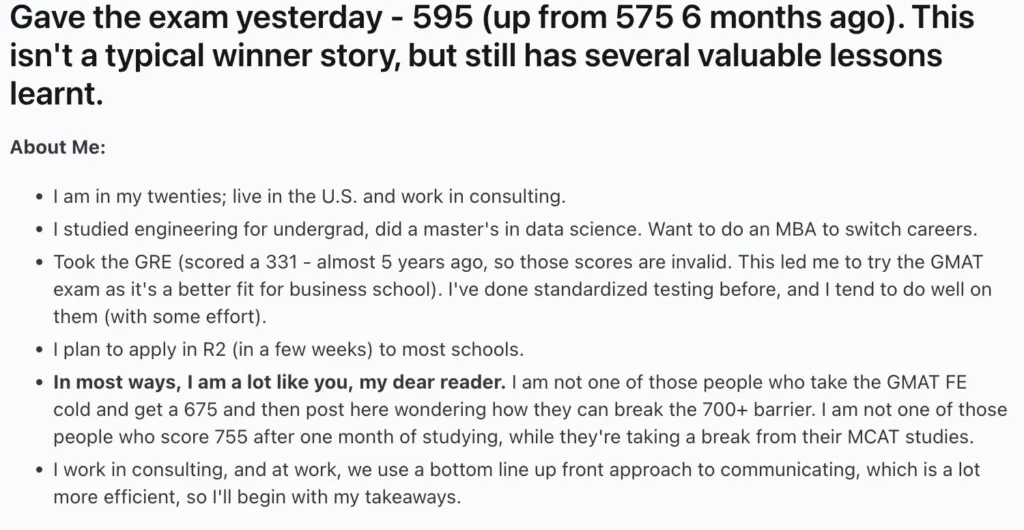Reddit Snapshot Below!

The student is in their twenties, lives in the U.S., and works in consulting. With an engineering degree from undergrad and a master’s in data science, the student wants to pursue an MBA to switch careers. They initially took the GRE almost five years ago, scoring a 331. Any anyone feeling, why their GMAT score is not improving or doesn’t improve, this is the other side of the story of why this might happen!
However, with those scores now invalid, they decided to try the GMAT, as it seemed like a better fit for business school. Having taken standardised tests before, the student knows they tend to do well with some effort. The journey is detailed out here in Reddit.
The student plans to apply to most schools in Round 2, which is just a few weeks away. In many ways, the student is like most other GMAT test-takers—neither someone who takes the GMAT cold and scores 675 nor someone who studies for one month and lands a 755 while taking a break from MCAT prep.
At work, the student is used to a “bottom line up front” approach to communication, which they believe is more efficient. To that end, they offer their key takeaways:
The Student’s Takeaways
Do not place trust in prep platforms that promise huge score increases without committing to a timeline.
The student warns against platforms that charge hefty monthly fees but offer no guarantee on how quickly they’ll help you improve. They liken this to a taxi driver being paid per minute—it’s not in the driver’s best interest to get you to your destination quickly. Eventually, frustration sets in, but switching platforms feels psychologically difficult due to the sunk cost fallacy.
Think strategically
One of the best pieces of advice the student received was to “check in with yourself midway through a Quant problem (i.e., at the 1-minute mark). If you’re not close to an answer, guess and move on.” This philosophy can be applied to GMAT prep as well—if your current approach isn’t working, it might be time to cut your losses and try something new, whether that means switching prep providers or even considering the GRE. Switch if you feel that the GMAT score is not improving!
Progress should be evident throughout your journey, not just at the end.
The student emphasises that true progress is reflected in a trend of increasing scores on GMAT Official Practice Tests—not on third-party problem sets or other metrics.
Avoid doing problem sets that repeatedly test the same concept.
Platforms that make you solve multiple problem sets on the same concept (e.g., ratios) create an artificial sense of mastery. In reality, part of the GMAT challenge is figuring out what the question is testing. The student advises against this kind of repetitive practice, as it doesn’t reflect the real exam.
Prioritise official GMAT practice problems.
While third-party problems can supplement your prep, official GMAT problems should always be the primary focus. They come with detailed solutions available on forums like GMAT Club and are far more representative of the real test.
Master the basics of Quant
According to GMAT Ninja and Manhattan Prep, most of GMAT Quant revolves around fundamental concepts like fractions, percents, decimals, ratios (FPDRs), word translation problems, rate problems, and algebraic manipulation. Mastery of these areas will take you further than diving deep into low-ROI topics like combinatorics or advanced probability.
Prep shouldn’t take more than 3-5 months.
The student argues that extending prep beyond this time frame can lead to frustration and mental fatigue. They highlight the importance of checking in with yourself around the 3-month mark to evaluate progress. You should not be having the feeling that GMAT mock score is not improving by 3 month mark!
Understand why you’re taking the GMAT.
If the goal is to switch careers through an MBA, spending over a year on GMAT prep could mean losing valuable time that could be better spent on building your post-MBA career.
The Student’s Overall Journey
The student began prepping for the GMAT in April 2024 using the Official Guide. In retrospect, they admit they were woefully unprepared for their first attempt on July 1, 2024, where they scored a 575.
Gruelling TTP Journey but GMAT score was not improving
Determined to improve, the student embarked on a five-month journey with TTP. They trusted the process and diligently worked through the missions, completing as many examples and problem sets as possible. However, by early October, they realized the course pace was too slow to meet Round 2 deadlines. Stress mounted as they had no evidence of improvement and had yet to take official practice tests. In a rush, they accelerated their prep and completed the course in early November.
To their dismay, the student scored 555 on their first GMAT Official Practice Test after finishing TTP—20 points lower than their initial attempt. Frustration set in as they realized they had spent months mastering “very difficult” questions but hadn’t developed the ability to guess and move on when stuck, a critical skill for the GMAT.
Manhattan Prep helped a bit
In mid-November, the student switched to Manhattan Prep and read through the “All the Verbal” and “All the Quant/DI” books. With the deadline approaching, they combined MPrep strategies with official GMAT practice tests, seeing scores improve to the 615-645 range. While this gave them hope, they were still far from their target score.
They turned to GMAT Ninja videos for Quant, which they found transparent and effective. With consistent practice, the student was able to score in the low-80s percentile in Quant. Using a mix of GMAT Ninja and MPrep approaches, they completed 2-3 more official practice tests.
Only 20 Point Increase
The student took the GMAT in late December 2024 and scored a 595. While it was a 20-point increase from their first attempt, it fell short of their expectations despite months of effort.
Final Reflections
The student is now taking a break but remains open to advice on how to come back stronger. Their parting message to fellow test-takers is to stay strong, keep perspective, and remember: the GMAT is just a test—nothing more, nothing less.
Don’t be swayed by not being able to improve your GMAT score and there are multiple other journeys where students improved!
- Improve GMAT score from 500 to 700
- How to Score 700+ on GMAT Focus
- Practice GMAT at Home
